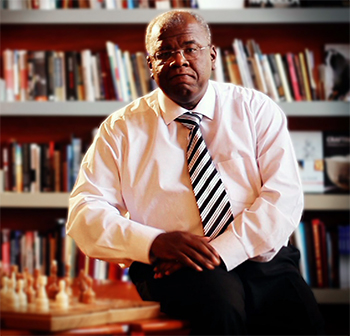Latest News Archive
Please select Category, Year, and then Month to display items
12 January 2024
|
Story Nonsindiswe Qwabe
|
Photo Sonia Small
 Since joining the UFS in 2008, Dr Grey Magaiza has worked extensively on approaches that can foster the socio-economic transformation of societies.
Since joining the UFS in 2008, Dr Grey Magaiza has worked extensively on approaches that can foster the socio-economic transformation of societies.
“The future should be one where communities can decide on their development agenda and futures. That’s the most important for me.” Dr Grey Magaiza, Deputy Director of the Centre for Gender and Africa Studies (CGAS) and Head of the Community Development programme on the Qwaqwa Campus, is passionate about capacitating communities to be agents of change and advancement. His vision for the future emphasises the empowerment of communities to take charge of their development by actively participating in decision making and the implementation of development projects that can improve their lives.
Since joining the UFS in 2008, Dr Magaiza has worked extensively on approaches that can foster the socio-economic transformation of societies. Over the years, he has crafted his research speciality into one that he is most proud of – being an interdisciplinary scientist immersed in the development of communities.
“I’m in a fortunate position of researching what I like. I say ‘fortunate’, because I’ve taken the time to understand what I’m passionate about, which is the overall field of rural livelihoods and livelihood futures – in short, community development. My research starts from an engaged university, understanding the elements that a university must use to enhance transformation and relevance to its immediate community in terms of development.”
One of the ways he has done this is by looking at social entrepreneurship as a development approach for young people in a rural setting. Through workshops with non-profit and civic organisations in Qwaqwa, Dr Magaiza has been helping these organisations to map out their needs and actively meet them through the involvement and support of external role players.
“We understand that communities are part of the national development agenda, but even that national agenda respects community knowledge and intentions and allows communities to shape their identity. A critical enabler of this is community organising. You bring back the capacity in communities to have dialogues on issues affecting them as spaces for engagement, knowledge exchange, and for people to just talk about their way forward.”
By enabling communities to define their development agenda, they can address their specific needs, challenges, and aspirations, he said. “When I look at livelihood futures, it’s quite an exciting aspect of my work – it’s like looking into a fortune tellers’ globe, because you’re not deciding for communities what they should do, but the communities themselves take those decisions.”
Prof Jonathan Jansen elected as new ASSAf President
2016-10-28

Prof Jonathan Jansen, former Vice-Chancellor
and Rector of the UFS, has been appointed
President of the ASSAf.
Photo: Supplied
The Academy of Science of South Africa (ASSAf) has elected former Vice-Chancellor and Rector of the University of the Free State (UFS), Prof Jonathan Jansen, as its new President for the next four years. He succeeds Prof Daya Reddy. Distinguished Professors Brenda Wingfield and Barney Pityana were elected ASSAf’s new Vice-Presidents.
The minds that shape tomorrow
The academy’s directive is to advise and provide the government with evidence-based solutions to national problems; inspiration, and examples of how science and technology can be applied for the benefit of society. ASSAf represents scientists in South Africa but also represents the country in the international community of science academies.
Prof Jansen, who is currently a Senior Research Professor at the UFS and a Fellow at the Center for Advanced Studies in the Behavioral Sciences at Stanford University, is also a Fellow of the American Educational Research Association, a Fellow of The World Academy of Sciences, and President of the South African Institute of Race Relations.
The great achieve greatly
Prof Jansen’s book, Knowledge in the Blood: Confronting Race and the Apartheid Past won the Nayef Al-Rodhan Prize, the largest award from the British Academy for Social Sciences and Humanities, for its contribution to scholarly excellence and transcultural understanding.
In 2013, he was awarded the Education Africa Lifetime Achiever Award in New York and the Spendlove Award from the University of California for his contributions to tolerance, democracy and human rights. He holds honorary degrees from the University of Edinburgh, the University of Vermont and Cleveland State University.
Plans for the future
His recent books include Leading for Change, which was published this year. He is completing a new book explaining the current crisis in, and future prospects of, South African universities, due for release in mid-2017.